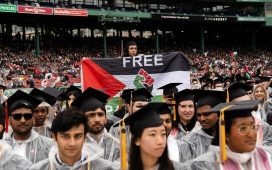Xinjiang is home to 25.85 million people, 14.93 million of whom are members of ethnic minority groups, including the Muslim Uygurs and Kazakhs.
EU sees 200% surge in Xinjiang imports despite human rights concerns
EU sees 200% surge in Xinjiang imports despite human rights concerns
Turkish ambassador to China Ismail Hakki Musa said that Xinjiang, as a core part of the belt and road strategy, could play a role in the Middle Corridor, also called the Trans-Caspian International Transport Route (TITR), an Ankara-backed Eurasian trade route.
China’s Uygurs, who speak a Turkic language, share cultural and linguistic ties with Turkish Muslims. Relations between Beijing and Ankara were once strained over Xinjiang but have eased in recent years as a result of closer economic relations.
Kazakhstan’s ambassador to China, Shakhrat Nuryshev, said Xinjiang had a “special place” in his country’s ties with Beijing. Around 1.6 million ethnic Kazakhs live in Xinjiang.
Central Asian countries are a priority for Xinjiang authorities in developing external relations.
These countries, most of which became independent in the early 1990s with the collapse of the Soviet Union, were once blamed as the source of separatist sentiments in Xinjiang because of their shared cultural similarities with ethnic minority groups there.
However, China’s ties with Central Asia have warmed over the past decade as Xinjiang’s security situation has improved and countries in the region have played a growing role in the belt and road – Beijing’s ambitious plan to build global trade and infrastructure links.

In a speech at the reception, Syrian ambassador to China Muhammad Hassanein Khalil Khaddam decried the “lies of some Western countries”, referring to allegations of human rights abuses in Xinjiang.
Syria has increased its cooperation with China in the face of Western sanctions as Beijing has strengthened ties with Moscow, an ally of Syrian President Bashar al-Assad. Assad travelled to China in September – his first visit since the Syrian civil war broke out in 2011.
Mohsen Bakhtiyar, Iran’s ambassador to China, said his country “links China and the West through Xinjiang”, adding that there were great opportunities for cooperation between Iran and Xinjiang in areas such as energy and minerals.
Pakistan’s ambassador to China, Khalil-ur-Rahman Hashmi, said Islamabad hoped to deepen cooperation with Xinjiang in trade, investment and other areas. In recent years, China and Pakistan have also strengthened their cooperation in counterterrorism.
The ambassador from South Africa also made a speech and envoys from Cuba, Saudi Arabia, Azerbaijan, Dominica, Georgia, Qatar and Serbia attended the event.
China’s Xinjiang invites overseas media to political meetings for first time
China’s Xinjiang invites overseas media to political meetings for first time
Xinjiang has sent multiple official delegations abroad in the past two years, and the region has frequently hosted foreign envoys, religious representatives and media figures.
In 2021, Xinjiang hosted more than 40 envoys from over 30 African countries in the regional capital of Urumqi.
In late January, Xinjiang for the first time invited foreign diplomats to attend the annual sessions of the region’s legislature and political consultative conference in Urumqi – its most important political event of the year. The diplomats who attended were mainly from countries that belong to the Shanghai Cooperation Organisation, a China-led regional security and economic grouping.
Wednesday’s reception was also attended by several senior Chinese officials responsible for Xinjiang, religious and foreign affairs as well as officials from Xinjiang in charge of ideology and foreign affairs.
Erkin Tuniyaz, Xinjiang’s regional government chairman and one of the officials sanctioned by the US for alleged human rights abuses, said the region had protected religious freedom, particularly the “healthy and orderly development” of Islam.
Chen Xiaodong, China’s vice-minister of foreign affairs, said Beijing would “actively promote” Xinjiang’s opening to the outside world. He added that he hoped the envoys would promote Xinjiang to the world and resist “lies about forced labour”.















